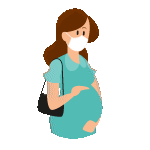Pregnancy diet or I should say healthy eating is very important for the would-be mommy. During pregnancy, the female's body undergoes many changes and thus requires more nutrients, vitamins and minerals for the well-being of both. A diet lacking in rich nutrient values may result in deficiency in babies. Same way eating too much or not eating healthy is equally bad for both. So it’s best advised to have a rich and healthy diet. The first trimester is the most crucial time, as the body is going through physical & emotional changes. One needs to be emotionally and physically sound to go through all the changes. Diet plays a very important role in pregnancy and one should religiously eat healthily and stay fit during these months. Therefore, we should follow some simple diet tips in the first trimester:
Dairy Products
Do you know why dairy products are recommended? Dairy products are derived from milk and milk substitute products are the best source of calcium and vitamins, which helps in building strong bones. Dairy products can be consumed in any form of milk, cheese, and curd.
Protein

Protein is equally important for mom and baby. Egg, lentils like kidney beans are the good source of protein.
Fruits

Fruits are rich in fibre and vitamins; indulge in fresh fruit juices or fresh fruit(s). Avoid canned juices. Include citrus fruits such as an orange, lime as they are full of vitamins c. Eat whatever fruit you like or ones that suit you.
*Avoid raw papaya from your diet.
Vegetables
vegetables are the best source of iron, add green leafy vegetables to your diet. Choose vegetables that are dark in colour like red, green, yellow and orange.
Whole grain

Whole grains like whole wheat, oats, quinoa can prevent many health problems such as diabetes. Grain is essential for the growth of the placenta.
Non-vegetarian diet
If you are a non-vegetarian than indulge in lean meat, chicken and fish. Be sure that the meat is washed and cooked well.
Water

Drinking water is very necessary to stay hydrated. If the water level in amniotic sac is as required then it becomes easy for the baby to move and protects the foetus. Last but not the least pregnancy is the time when the pregnant women crave for different food items. In short, eat what you like and avoid unhealthy food. First Trimester is the most crucial time for a mother, as the baby is developing his entire organ and right diet is equally important for his growth. If the pregnant woman is lacking in some nutrients values, it may lead to birth defects. That’s why all doctors prescribe folic acid, iron, iodine and calcium medicine to one’s diet so that the baby grows healthy and fit because only healthy eating does not help initially. The first trimester is also the time when miscarriages take place, so it’s advisable to stay healthy, don’t take the stress and be happy. Please note - Consult your doctor for any medical advice or before taking any medicine for vitamins and so on. Always remember to follow, what your doctor advises you, he knows the best.
FAQ's
Q. Why is a healthy diet crucial during the first trimester of pregnancy?
Ans.The first trimester is when the baby’s vital organs begin developing. A balanced, nutrient-rich diet supports fetal growth, strengthens the mother’s body, and reduces the risk of birth defects. Poor nutrition or overeating can cause complications, making healthy eating essential for both mother and baby.
Q. What dairy products are recommended during early pregnancy?
Ans.Milk, yogurt, paneer (cottage cheese), and cheese are excellent dairy options. They provide calcium, vitamin D, and protein, which support bone development in the baby and maintain the mother’s bone strength. Ensure all dairy consumed is pasteurized to avoid infections.
Q. How much protein should a pregnant woman consume?
Ans.Protein is vital for cell growth and muscle development. Include sources like eggs, lentils, chickpeas, tofu, and lean meat. Aim for two to three servings a day, but consult your doctor for personalized needs based on your health and body weight.
Q. Are fruits necessary in a pregnancy diet?
Ans.Yes, fruits offer vitamins, fiber, and antioxidants. Citrus fruits like oranges and lemons are rich in Vitamin C, boosting immunity. Choose fresh fruits or homemade juices. Avoid canned or overly sweetened options. Steer clear of raw papaya due to its enzyme content that may be harmful.
Q. Which vegetables should be included in the first trimester diet?
Ans.Dark-colored vegetables like spinach, broccoli, carrots, and bell peppers are rich in iron, folate, and fiber. These support blood formation and fetal development. Green leafy veggies especially help prevent anemia. Wash vegetables thoroughly to avoid exposure to pesticides or bacteria.
Q. Why are whole grains important for pregnant women?
Ans.Whole grains like oats, brown rice, and whole wheat are high in fiber, iron, and B vitamins. They provide sustained energy, support placenta growth, and help regulate blood sugar. Incorporate whole grains in every meal for better digestion and long-term health benefits.
Q. Can non-vegetarian foods be safely consumed during pregnancy?
Ans.Yes, lean meats, chicken, and properly cooked fish are rich in protein and iron. Ensure the meat is well-cleaned and thoroughly cooked to avoid foodborne illnesses. Avoid raw or undercooked seafood and opt for low-mercury fish like salmon or tilapia.
Q. How much water should a pregnant woman drink daily?
Ans.Staying hydrated is essential. Aim for at least 8-10 glasses of water daily. Proper hydration supports amniotic fluid levels, aids digestion, prevents constipation, and helps flush out toxins. Drinking water also helps in managing pregnancy fatigue and headaches.
Q. What nutrients are commonly supplemented during the first trimester?
Ans.Doctors usually prescribe folic acid, iron, iodine, and calcium. These supplements support brain development, prevent neural tube defects, maintain hemoglobin levels, and promote bone growth. Always take them as prescribed by your healthcare provider and never self-medicate during pregnancy.
Q. Are pregnancy cravings safe to follow?
Ans.Mild cravings are normal and safe when they involve nutritious foods. However, avoid junk food or raw/processed items. Listen to your body but balance cravings with healthy choices. If you experience unusual cravings (like for chalk or dirt), consult your doctor immediately.





















